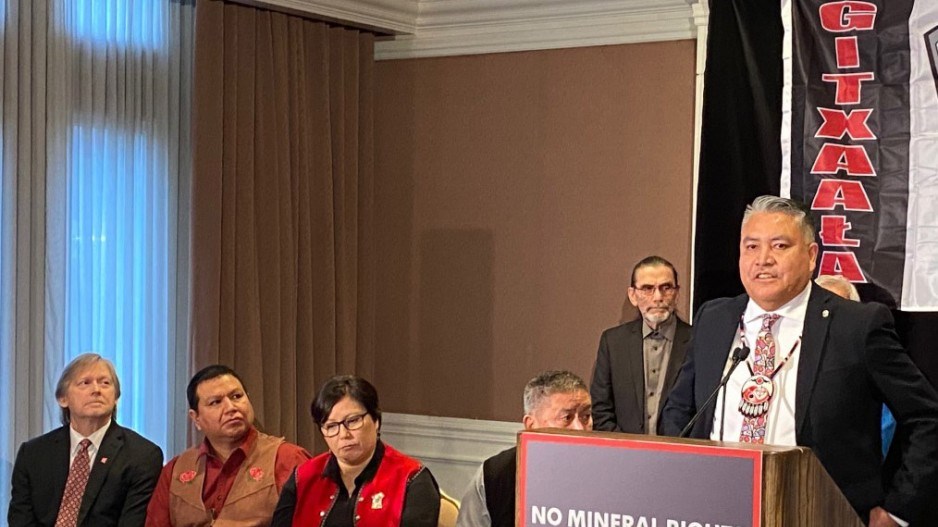The principle of free, prior and informed consent embedded in UNDRIP must apply to mineral claims in B.C., First Nations will argue in court – something that has the mining and exploration industry in B.C. worried.
First Nations, environmental groups and mining and exploration industry associations are in court today seeking intervenor status in a case that could have wide-ranging implications for mineral exploration in B.C., as well as the federal government’s critical minerals strategy, should the case succeed.
At the heart of the case is the free entry mineral claim system that allows anyone to file a mineral claim without notifying or engaging with First Nations – something First Nations speaking at a press conference Thursday said breaches the spirit of the Declaration on the Rights of Indigenous Peoples Act (DRIPA) and the United Nations Declaration on the Rights of Indigenous People (UNDRIP) on which it is based.
Last year, the Gitxaala First Nation filed a judicial review over mineral claims in its traditional territory on Banks Island. In June this year, the Ehattesaht First Nation also filed a similar judicial review challenging mineral claims in their traditional territory. The two First Nations have agreed to have both reviews tried at the same time.
The case is scheduled to be heard in April 2023. The B.C. government is contesting the judicial review.
“Unfortunately, the legal representatives from the province of B.C. have instructions to oppose the relief sought by Gitxaatla Nation," said Terry Teegee, regional chief of the B.C. Assembly of First Nations. "This is a clear example that the province of B.C. is trying to have it both ways.”
B.C. enshrined UNDRIP into law through DRIPA. First Nations assume that means it supports the principal of free, prior and informed consent, which they say should include the staking of mineral claims.
Grand Chief Stewart Phillip, president of the Union of BC Indian Chiefs, called the Mineral Tenure Act "a relic of colonization."
"We know it's a relic of colonization when somebody can huddle over their keyboard in a dark basement and file a claim to tens of thousands of acres of indigenous lands without any consultation whatesoever," he said. "That's a complete, egregious violation of DRIPA."
Several First Nations associations, including the BC Union of Indian Chiefs, B.C. Assembly of First Nations and First Nations Summit, are backing the Gitxaala and seeking intervenor status.
The Association of Mineral Exploration (AME), Mining Association of BC (MABC) and Prospectors and Developers Association of Canada (PDAC) are also seeking intervenor status, and will argue against changing the free entry claim system.
Interestingly, one junior exploration company is also seeking intervenor status – not on the side of the industry, but on the side of the Gitxaala.
Of seven mineral claims filed on Banks Island, two have since been voluntarily withdrawn, according to West Coast Environmental Law. The Gitxaala want the remaining claims suspended, and a moratorium placed on all further claims in Gitxaala traditional territory, pending an overhaul of the Mineral Tenure Act to change the way mineral claims are approved.
Banks Island is where a small gold mining operation was shut down in 2015, following multiple permit violations and a discharge of effluent into local waters. The company operating the mine, Banks Island Gold, went bankrupt and the mine shut down.
More broadly, the Gitxaala want the Mineral Tenure Act reformed, and specifically want to see an end to the “free entry” claim process that allows anyone to stake a mineral claim without telling anyone, including relevant First Nations.
While the AME is not opposed to reforming the Mineral Tenure Act, it opposes changing the free entry system.
“That’s the piece that does not work for us,” said AME president Kendra Johnston.
The very nature of prospecting is that no one, thinking they may have discovered a potential mineral deposit, wants it broadcasted publicly. Prospectors put a lot of work into identifying regions with potential mineral deposits before they file a mineral claim to conduct exploratory work. Johnston said it is a kind of intellectual property. Simply letting others know that a claim has been filed is, in a sense, like making intellectual property public.
“They don’t want to give the idea – the intellectual property – away at that point,” Johnston said.
Staking a mineral claim allows prospectors to do preliminary exploratory work, including gathering soil and rock samples.
“There is no mechanized work allowed,” Johnston said. “So no drill rigs, no rock saws – nothing that requires energy to run.”
To do anything more than “passive” exploration, the claims holders must apply for a permit. This requires an archeological plan and First Nations engagement.
“Then the government is required to consult with the First Nation,” Johnston said.
Once a permit is approved, that allows mechanized work to take place, like building trails, using rock saws and using drilling rigs to take core samples.
“A change to the free entry system to have to consult prior to staking would impact exploration in British Columbia,” Johnston said. “There would be, I think, an incredible decrease in exploration happening pretty quickly.
“Consultation or notification or engagement right after staking is reasonable. It’s just the fact that it can’t happen before you stake your claim because of the competition piece.”
At least one junior exploration company doesn’t have a problem with changing the claim system.
Tony Fogarassy, chairman of First Tellurium Corp. (CSE:FTEL), said his company supports the Gitxaala, and is also seeking intervenor status. The company is a member of the Initiative for Responsible Mining Assurance (IRMA), Fogarassy said. Members are big corporations that want assurances that any mined materials they buy are mined responsibly and ethically.
“These companies and their shareholders demand sustainable and responsibly mined minerals in their supply chains, and that means minerals produced with the consent of indigenous peoples,” Fogarassy said. “By definition that consent includes the registration and issuance of mineral claims and mining leases.”




